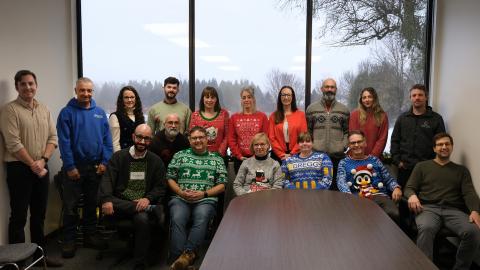
SDG COUNTIES, Ontario - With 2024 now closed, the Raisin Region Conservation Authority (RRCA) is looking back on a successful 61st year of community-led, watershed-based natural resource management.
“We are incredibly proud of the important work accomplished by the whole team at the RRCA,” said Bryan McGillis, Chair of the RRCA’s Board of Directors and Mayor of South Stormont. “Our staff and summer students, with the support of our community partners, provide invaluable services to our local communities and environment within RRCA’s 1,680 square-kilometre watershed jurisdiction.”
One of Ontario’s 36 conservation authorities, the RRCA protects people and property from natural hazards like flooding and erosion, protects municipal drinking water at the source, conserves environmentally significant land, provides recreation and eco-tourism opportunities, and offers landowner stewardship incentives. The conservation authority’s eight-member Board of Directors is made up of elected officials appointed by the municipalities in its jurisdiction: the City of Cornwall and the Townships of South Glengarry, South Stormont, North Glengarry, and North Stormont.
“We work with our municipalities across our watershed for the benefit of our region’s sustainability and resilience,” said Alison McDonald, who became the RRCA’s General Manager/Secretary-Treasurer in June. “Thanks to our board’s leadership, and the dedication of our qualified staff, I’m pleased to say that 2024 was another successful year. We continued to provide locally focused programs and services designed to balance human, environmental, and economic needs.”
Protecting People and Property
This year, the RRCA completed the updating and improvement of regulatory mapping (flood hazard) for the Eastman Drain watercourse in South Stormont and the City of Cornwall. The new maps identify the floodplain for a one per cent annual exceedance probability, also known as a 100-year flood event. The RRCA held a virtual public information centre about the updated mapping in April. The new flood hazard mapping for the Eastman Drain is the result of a partnership between the RRCA, SDG Counties, the Township of South Stormont, and the City of Cornwall. This project is funded in part by the Government of Canada, the Province of Ontario, and SDG Counties. The RRCA also completed a project for flood hazard identification and priority setting within its jurisdiction.
In 2024, the RRCA continued to issue all its permits within mandated timelines. In all, the authority issued 82 permits, responded to 208 formal and general property inquiries, and provided official comments on 108 Planning Act files.
“It is important to contact the RRCA when considering development projects near water, as certain activities require review and approval from the RRCA,” said Phil Barnes, the RRCA’s Watershed Management Team Lead.
The RRCA also operates a Flood Forecasting and Warning Program, which monitors precipitation, water levels, and other conditions to provide advance notice to municipalities when water levels could rise above normal. This year the authority released five flood messages. Additionally, the RRCA assists the Ministry of Natural Resources with Ontario’s Low Water Response program, which helps manage water during a drought. No 'Low-Water' messages needed to be issued locally by the RRCA in 2024. The RRCA also operates eight water-control structures in its jurisdiction and conducts water quality and snowpack monitoring.
Sources of drinking water for the Raisin-South Nation Source Protection Region’s 25 drinking water systems continued to be protected from contamination and overuse through the area’s Source Protection Plan. In 2024, the local Source Protection Committee revised the plan and its policies under the direction of the Minister of the Environment, Conservation and Parks to best protect local drinking water sources. The draft plan is currently available at yourdrinkingwater.ca/Consultations, where it is receiving feedback through a public consultation period until Jan. 31.
Land conservation and recreation opportunities
This year, the RRCA received its first land donation through Canada’s Ecological Gifts program when the McKay family donated 89 acres of forest and provincially significant wetland in South Glengarry to the conservation authority for perpetual preservation. In all, the RRCA conserves and manages more than 2,000 acres of environmentally significant land to enhance forest cover, mitigate flooding and erosion, protect sensitive ecological habitat, and provide recreation opportunities to the public at its three conservation areas: Cooper Marsh, Charlottenburgh Park, and Gray’s Creek. The three public greenspaces welcomed more than 165,000 visitors in 2024.
“Our conservation areas provide more than 20 kilometres of nature trails open year-round at no cost,” said Pete Sabourin, the RRCA’s Field Operations Team Lead. “They also include a campground, marina, interpretive centre, picnic areas, self-guided tours, wildlife viewing blinds, and more.”
Last March, the RRCA created additional open water habitats within Cooper Marsh Conservation Area in South Glengarry. The work was one of the final components in the Cooper Marsh Biodiversity Project, a multi-year biodiversity enhancement effort undertaken with the financial support of the Nature Smart Climate Solutions Fund, a Government of Canada’s Department of Environment and Climate Change program in partnership with Conservation Ontario. Funding was also awarded by Ontario Power Generation.
In July, the RRCA and Ducks Unlimited Canada (DUC) celebrated the full reopening of Cooper Marsh after the completion of extensive repairs to the 673-acre Conservation Area’s system of ring dykes thanks to provincial funding secured by DUC. Work to repair and strengthen the dykes began in fall 2022 with the financial support of Ontario’s Ministry of the Environment, Conservation and Parks through the Wetlands Conservation Partner Program (WCPP).
Cooper Marsh also hosts school education programs and summer day camps offered in partnership with the River Institute’s award-winning education team.
Fostering Landowner Stewardship
From tree planting to agriculture best management practices, the RRCA provides landowner stewardship services to improve the health and resilience of local watersheds. In 2024, the RRCA added 52,000 trees to the local landscape and facilitated community tree planting events in North Glengarry, South Glengarry, and the City of Cornwall.
“Our services are designed to make it easier for property owners to become stewards of their land, whether that means planting a riparian buffer to prevent erosion, creating a windbreak, restoring grassland habitat, or other projects,” said Lisa Van De Ligt, RRCA’s Stewardship and Communications Team Lead.
The RRCA is currently accepting applications to its popular Over-the-Counter Tree Program until March 31. The program gives landowners in its jurisdiction access to a selection of native tree and shrub species at low cost. The application form can be found at rrca.on.ca/Trees. For projects involving 500 trees or more, the RRCA also offers a full-service planting program with significant subsidies thanks to a partnership with Forests Canada.
Through the ALUS Ontario East program – which helps farmers and ranchers establish and maintain nature-based solutions on their land – 34 stewardship projects by 12 participants took place on 102 acres.
